Las Vegas surgeon continues to provide care for uninsured
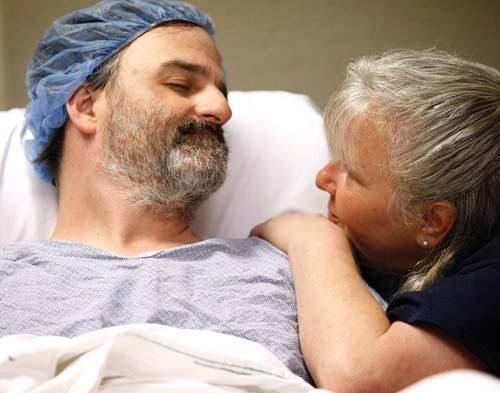

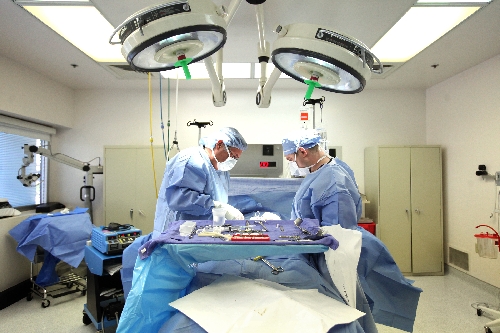
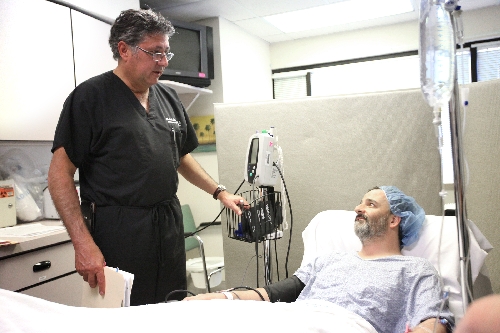
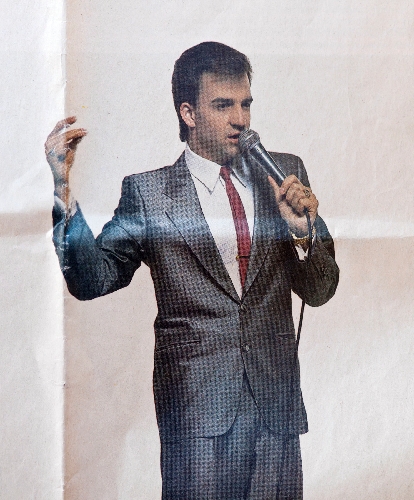
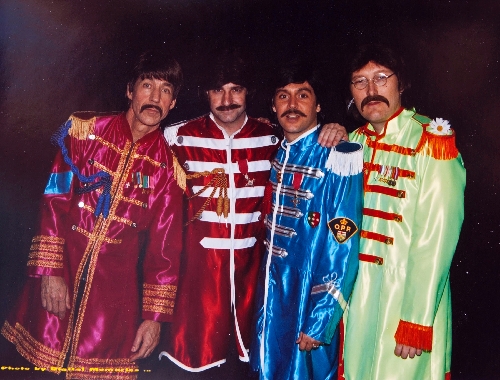
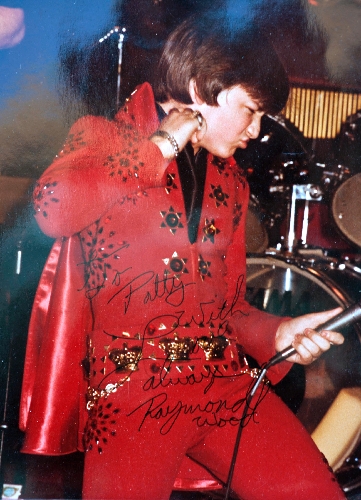
When Ray Wood was just 16, he was already performing on the Strip, playing Bobby Darin in "Legends in Concert."
It was 1984 and his future seemed boundless. Audiences loved his renditions of "Splish Splash" and "Mack the Knife."
His success at the Imperial Palace brought a full-page spread in the Las Vegas Review-Journal.
Though his show business career never took off the way he’d dreamed, he continued to work steadily in bands around town in the ’90s as a guitarist and as Darin in "American Superstars" shows at the Flamingo in both Laughlin and Las Vegas.
In a Beatles tribute at the Frontier Hotel during the early years of the last decade, he played George Harrison. He also worked in a supervisory role for a Long John Silver’s restaurant.
And then five years ago the uninsured entertainer who started working full-time as a teenager couldn’t work any longer.
A painful hernia that descended into his scrotum made it impossible to stand for long or to lift anything.
Repeated filings for government assistance that would make a hernia repair possible were always denied.
"We became homeless," said Wood’s longtime girlfriend, Brenda Sanders, who makes about $1,000 a month caring for boarded dogs. "We drifted until my mother helped us get into a studio apartment. Food stamps have helped."
What happened to Wood is the kind of story that Las Vegas surgeon Dr. Kevin Petersen hears repeatedly – too often, good hard-working people fall through the government’s health care safety net.
It is why he became the driving force behind the formation of Helping Hands Surgical Care, a nonprofit organization that has a half-dozen doctors performing surgeries at no cost to the uninsured, and it is also why Wood was scheduled for a free hernia repair.
"You hate to see people who want to work unable to do so because they can’t afford a routine surgery," Petersen said.
Last week the 44-year-old Wood would become the 15th individual to receive a free surgery since the nonprofit’s November inception. Petersen became aware of his plight through a letter from his girlfriend’s mother.
As a nurse outfitted Wood with an IV last week, he seemed in shock.
"I can’t believe this is happening," he said. "I’ve been turned down so many times."
KEEPING IT GOING
To help ensure there are many more free surgeries in the future – the surgeons still must pay for the operating room and supplies – friends of the nonprofit are holding a fundraiser from 5 to 9 p.m. Friday at Tease Boutique Salon, 9540 W. Flamingo Road, Suite 160. There will be music, food, a fashion show and salon services.
"We have 125 people on our waiting list for surgeries right now," Petersen said.
Wood’s case sheds some light on why the government’s safety net doesn’t work for everybody.
Charles Duarte, who oversees the state’s Medicaid program, noted that Nevada, in an effort to hold down costs, restricts eligibility to the medical aid program more than many other states.
Childless adults age 21 to 64, he explained, basically only become eligible for Medicaid if ruled disabled by the federal Supplemental Security Income program.
"They only rule somebody disabled if they’re severely disabled," he said.
Because Wood can stand up and walk a little, he’s not considered severely disabled.
"The thing is nobody will hire you if you can’t really walk and can’t lift anything at all," Wood said as he sat in his studio apartment in the days before his procedure. "I can’t even carry plates of food without being in pain."
Duarte said the Patient Protection and Affordable Care Act introduced by President Barack Obama and passed by Congress is supposed to take the holes out of government’s safety net, ensuring that people in Wood’s situation receive care.
FEDERAL RESTRICTIONS
However, he noted that with U.S. Supreme Court deciding the act’s constitutionality, it is far too early to say that the uninsured will see their predicaments change.
Under federal law, it is true that hospitals have to perform operations on the uninsured – but only in life-and-death situations or when a woman is delivering a baby.
"If I was actually dying, then they say they’d take me," Wood said. "It really doesn’t make sense to me. You’d think the government would be better off with me working and paying taxes."
Wood took out a video that showed him working as a clean-shaven Bobby Darin. Wearing a tuxedo with his hair slicked back, he was full of finger-snapping energy, showing off his dance moves.
"Quite a bit different from me today," said the bearded Wood, whose diminished energy and high pain level made it difficult to walk across the cramped room. "But I can get back in shape. I know I can."
About 2,000 people die from hernias each year and Wood definitely doesn’t want to be one of them.
When death does occur, it often happens when part of the intestine becomes trapped in the abdominal wall, diminishing blood flow to this portion of the intestine.
The condition is called strangulation, leading to the death of the affected bowel tissues. Immediate surgery is necessary.
"I think about that a lot," he said. "Whether I’d be able to get to the hospital on time."
NECESSARY ELECTIVE OPERATIONS
Generally, the patients helped by Helping Hands receive what are called medically necessary elective operations for conditions that don’t pose an immediate threat to a patient but that can progress to become life-threatening.
Petersen started the charity organization because of the growing number of people who showed up at his office desiring care but lacking the means to pay for it.
"I can’t tell you how many times I went to doctors or hospitals in terrible pain and they just pushed the bulge in my groin back in," Wood said. "They’d give me pain pills. Or a hospital would give me a referral to a surgeon but I could never go because I couldn’t afford it."
The type of hernia Wood has basically suffered from – Petersen also discovered he had a minor umbilical hernia to repair – is called an inguinal hernia. It occurs when soft tissue, usually part of the intestine, protrudes through a weak point or tear in the lower abdominal wall.
Often the cause is heavy lifting, which Wood recalls doing with large boxes of videos.
When the protruding intestine descends into the scrotum, as Wood’s often does, the pain is nearly unbearable.
"He said he often had a ’10’ on pain and I believe him," Petersen said.
REVIEWING THE CASES
What pushed Wood to the top of the surgery list – Petersen has a medical advisory board that makes recommendations – was his overall good health and that surgery would allow him to work again in less than a month.
With Helping Hands still in its fledgling stages, Petersen said he and other surgeons are trying to keep the surgeries as simple as possible.
"When you’re just starting out with a program that you want to last for years,, the worst thing that could happen are major complications," he said, noting, however, that there is no such thing as a "perfectly safe" surgery.
People can die unexpectedly, for example, from allergic reactions to anesthesia, from infections, from mistakes.
About 600,000 hernia repair operations are performed in the U.S. each year. While many surgeons insert a mesh patch to repair or close the opening in the abdominal wall, Petersen does his surgeries without it.
Petersen has been alarmed by studies showing that a growing number of patients’ bodies reject the mesh, necessitating further surgery. Still other studies have found that surgically implanted mesh becomes dislodged, allowing a recurrence.
Some mesh has been recalled by the Food and Drug Administration because of safety issues. Many patients have filed malpractice lawsuits over it.
Petersen uses live muscle tissue adjacent to the hernia site to repair and reinforce the weakened area. His recurrence rates for hernias fall in the 2 percent to 3 percent range.
‘I JUST WANT THIS OVER’
When Wood arrived last the morning of April 23 at the Medical District Surgery Center – it’s a small outpatient center not far from University Medical Center – he knew nothing about the debate over surgical techniques for hernias.
All he knew was that he wanted to be out of pain, that he wanted some hope for the future.
"I just want this over," he said.
Sanders had tears in her eyes as she kissed him.
An hour after the surgery began, Petersen was finished.
In two weeks, he said, Wood should be able "to pound the pavement" looking for work. In a month, he’ll be able to do "unrestricted activity."
Two days after his surgery, Wood answered his phone.
"The hardest part’s over," he said. "As soon as I heal, I’ve got options for my life. I wasn’t sure I’d ever have that again. I’m really grateful."
Contact reporter Paul Harasim at pharasim@reviewjournal.com or 702-387-2908.
HELPING THE CAUSEWhat: Helping Hands Surgical Care fundraiser
When: Friday, 5-9 p.m.
Where: Tease Boutique Salon, 9540 W. Flamingo Road, Suite 160
Details: 242-5393 or HelpingHands SurgicalCare.com












